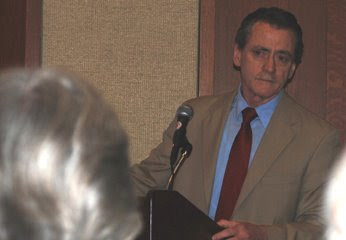
NEW YORK, 25 June 2009 – I took questions following my presentation on “backpack journalism” at the Harvard Club on W. 44th St. in New York City. I also screened my recent piece, “Afghanistan: The Forgotten War,” which was broadcast last year by NOW on PBS. The event was closed to the public and only Harvard graduates and special guests were allowed to attend. I was invited to speak at the Club by a participant in one of my Backpack Journalism Workshops With NOW on PBS.
It was a pleasure to be engaged with people who were deeply interested in journalism and current affairs, the importance of our craft to our democratic society, and the role of backpack journalism in the future. Following are some edited remarks from my presentation. (Photo by Anushka Wirasinha)
“We are, right now, at an extraordinary juncture in the history of mankind, technology and communication. Even more important than the Gutenberg press, the advances in digital cameras and the Internet provide us unprecedented opportunity. Ordinary citizens of the world now wield extraordinary power. We wield the power to communicate instantly, globally and in a language, the visual language, that supersedes both the written and the spoken word. This visual language knows no frontiers. It needs no translation. It is contingent on no corporate support. It is one of the most powerful tools of our time.
“And backpack journalism is the embodiment of this visual language. Unfortunately, this model too often is used merely to reduce the cost of newsgathering, as opposed to delivering a more effective brand of journalism.
“The real promise of this model is that it represents a viable alternative for gathering and disseminating information critical to our democratic system. With some institutional support, like that provided me by NOW on PBS for the piece you just saw, the information we need to help determine our own destinies can be at our finger tips.
“My hope is that we, collectively, recognize and understand where we are now, what our alternatives are, at this critical juncture. My hope is that we demand more and better information about the key issues of our time. About the very real consequences of our collective decision to send young men and women to places like Iraq and Afghanistan. About what is happening in those places BEFORE we become entangled in them.
“No matter what the new media landscape looks like after the current upheaval, I hope – no, I trust — that backpack journalism will be an important part of it.”
